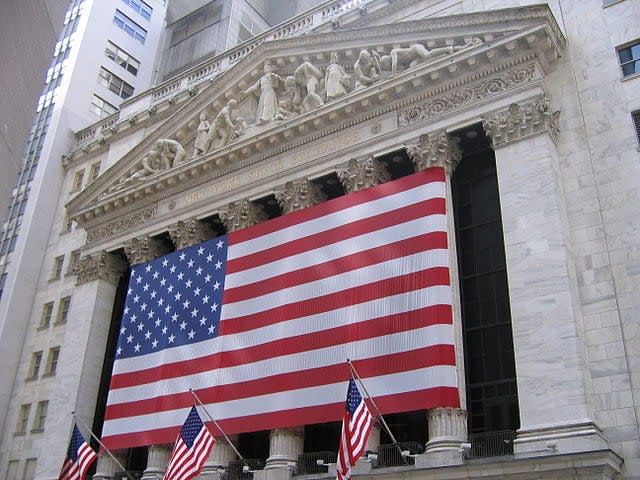Reality Check: The DJIA Highs Are Partly a Sham, Five Big Drags with Runner-Up Drags

The news of the Dow Jones Industrial Average hitting new highs this week is certainly good news. The problem is that the news comes with some serious caveats. We just featured that there are really only seven of the 30 DJIA component stocks that would be needed to take the DJIA up even higher to 15,000. The rest of the market could stay the same, but there are some serious DJIA laggards that have to be considered when you see that the market is back to all-time highs.
General Electric Co. (NYSE: GE) is perhaps the biggest disappointment of all DJIA stocks. After all, GE probably represents the broad economy more than any other single DJIA stock. It has business and personal finance, oil, power, energy, appliances, health care and many other aspects covering each sector of the economy. At $23.75, and with a market cap of about $245 billion, GE's stock is barely half of its share price from late 2007, and on the chart its stock would have to rise about 150% before taking out the 2001 highs back when valuations were silly at about 30 times earnings. GE has recovered well over 200% from its lows, but it its share price and market value are a fraction of the peak before the recession.
Bank of America Corp. (NYSE: BAC) may have been the best DJIA stock of 2012, but it is a shell of its former glory, if you count the price of the stock after the recession. In 2006 and in 2007 Bank of America was a $40 and $50 stock. Even after doubling from its lows, and even backing out a few dollars worth of dividends since then, has the stock at $11.84. It is very possible that Bank of America may not see its old highs for a generation or more, even if Warren Buffett and Berkshire Hathaway Inc. (NYSE: BRK-A) have a large stake. Its market cap is $128 billion, and it seems hard to imagine that shares would rise 200% to 300% further in any short period without hyperinflation.
Hewlett-Packard Co. (NYSE: HPQ) cannot win for losing, and it has been losing. This is not even due to the recession, but due to a change in technology demand toward Apple Inc. (NASDAQ: AAPL) and to smartphones and mobile computing. Mismanagement was another nail in the coffin, and even Meg Whitman has warned that the turnaround might not be seen fully until 2015 or so. The good news is that shares are actually back above $20, and that is approaching a double off of the lows of 2012. The bad news is that HP was basically a $50 stock back in 2010 and early 2011, when Mark Hurd was in charge. That company has been lost ever since Hurd was canned.
Alcoa Inc. (NYSE: AA) is another huge drag on the DJIA. Its stock is around $8.50 now and only has a market value of $9.1 billion. Should it even be a DJIA component any longer? If you go back to 2008, Alcoa had a share price actually above $40, and at one point there were even rumors that it would be acquired. How does an 80% price erosion feel for its shareholders who bought at the peak. Alcoa keeps maintaining that the global aluminum market will double in 2013. The question is whether it can find its fair share of that growth - if that growth can still be realized.
The Boeing Co. (NYSE: BA) probably does not seem like such a big drag on the DJIA, particularly since its new 52-week above $79 was just hit on Wednesday. The problem here is that the stock has been held back with development problems around the 787 Dreamliner, from development and production all the way into the endless post-launch woes. It also has sequestration risk and military and government aerospace risks that may be more than other DJIA stocks. Imagine how high Boeing would be flying if it was firing on all cylinders. It may be at a year-high, but it has been range-bound for quite some time and has not recovered its 2008 highs.
These probably all sound bad on the surface. Some are very bad, some are hopefully temporary. Intel Corp. (NASDAQ: INTC) and Cisco Systems Inc. (NASDAQ: CSCO) have been disappointing performers, as the tech giants have run into changing markets and competition that they used to be able to overcome better than they have now. Ditto for Microsoft Corp. (NASDAQ: MSFT) in its war with Apple Inc. (NASDAQ: AAPL), Google Inc. (NASDAQ: GOOG) and others.
It could be worse. American international Group Inc. (NYSE: AIG) and Citigroup Inc. (NYSE: C) were both such bad implosions during and after the recession that they had to be booted out of the DJIA entirely.
Filed under: 24/7 Wall St. Wire, Active Trader, Banking & Finance, Dividends & Buybacks, Economy, Index, Personal Finance Tagged: AA, AAPL, AIG, BA, BAC, BRK-A, C, CSCO, featured, GE, GOOG, HPQ, INTC, MSFT

